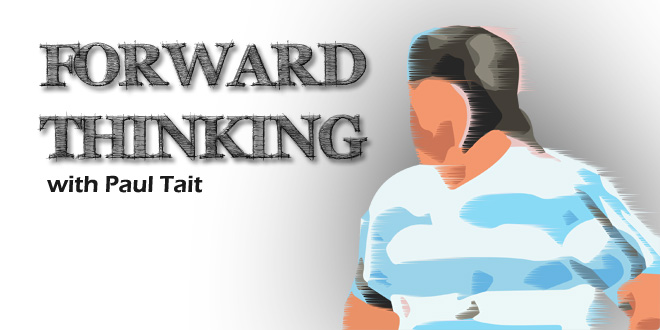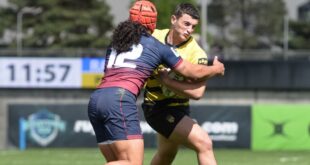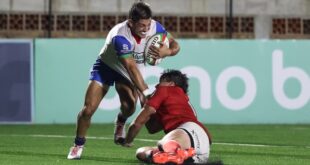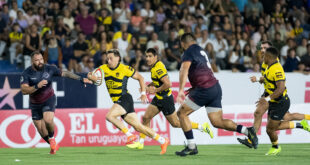Just days out from the fourth edition of the Rugby Championship the extent of Daniel Hourcade’s impact on Los Pumas is profoundly clear. In this week’s edition of Forward Thinking I will look into the impact of Hourcadism on Argentina’s fortunes over the past year.
Daniel Hourcade, the former Portuguese assistant coach and head of the Pampas XV took over a stagnating and aged Pumas team to transform it into a team looking notably better than had been the case in October 2013. Following disappointing 2012 and 2013 seasons Argentina finished 2014 strongly to give fans reason to believe the team could have a successful World Cup campaign.
2014 saw sweeping changes with big name players making way in a number of positions in preference of, in many cases, much younger players who could be described as being very green. The calculated risk ultimately paid off as Argentina won three of it’s final four tests of 2014.
Starting in these wins against Australia, Italy and France were players including Matías Alemanno, Rodrigo Baez, Jerónimo De la Fuente, Javier Ortega Desio, Facundo Isa and Guido Petti Pagadizaval of whom none had done so prior to the arrival of Hourcade.
Further changes in the year saw Matías Cortese, Mariano Galarza, Ramiro Herrera, Tomás Lavanini, Benjamín Macome, Manuel Montero, Francisco Nahuel Tetaz Chaparro and Joaquín Tuculet all starting against elite opposition despite none having been able to hold down regular squad places under Santiago Phelan.
Captaining the team in Mendoza and Paris was Agustín Creevy who was deputy to Eusebio Guiñazú throughout 2012 and 2013 and, during which time, had earned just one solitary start. The impact Creevy had justified the change and also saw Guiñazú’s international career ended against all expectations.
In addition to Guiñazú Patricio Albacete, Manuel Carizza, Julio Farías Cabello, Felipe Contepomi, Santiago Fernández, Juan Pablo Orlandi and Gonzalo Tiesi all started Rugby Championship tests in 2013 but were not involved in 2014. Now in 2015 Only Carizza remains in the 36-man squad.
The extent of the overhauling can be seen by the age of players currently in Christchurch, New Zealand. Indeed while Phelan had players aged up to 36 starting Rugby Championship tests Hourcade has Alemanno, Cordero, De la Fuente, Díaz, Isa Montoya, Noguera Paz and Petti aged 24 or younger preparing for the All Blacks as is the uncapped Juan Pablo Socino.
Díaz was alone in playing under Phelan making the six others Rugby Championship debutants. The experiment of starting Díaz was due to Marcos Ayerza having been injured at the start of the 2013 campaign but with Argentina losing by a record margin Díaz was a casualty. Pablo Matera remained but Phelan responded with conservative selections which saw a defensive oriented game plan.
Hourcade altered the game plan remarkably to have Argentina creating many more try scoring opportunities and, similarly, scoring more in 2014 than in 2013. The total of nine tries in 2014 was greater than the seven in 2013 but what was far more noteworthy was who was scoring the tries. In 2013 no wing or fullback scored with back-rower Juan Manuel Leguizamón being responsible for three.
Phelan had been playing with a slower, older back-three with Horacio Agulla, Juan Martín Hernández and Gonzalo Camacho having been the first choice trio. Of them none crossed for tries in 2013 but Hourcade’s prefered starting back-three of Manuel Montero, Joaquín Tuculet and Juan Imhoff scored five of Argentina’s nine tries.
The only try scored by a forward was that of Leonardo Senatore against Australia which was done by diving over near the corner flag. Expansive rugby, in other words, replaced conservative forward-orientated or, old-fashioned Argentine rugby and it brought results.
Those playing under Hourcade suit his game plan which requires younger, more agile players who can get to the tackle area faster. The will to dominate possession by slowing down the play has been replaced by maximizing the width of the field to create play.
Being a team sport different players are needed to fill different roles and Hourcade acted with this in mind not only by having Montero and Imhoff starting but moving Hernández and Agulla to positions in which they are arguably more suited to at this point in their careers.
Forward Thinking proved successful after Hourcade was called up in drastic circumstances to replace Phelan who had resigned ten days before Argentina’s 2013 end of year tour to Europe. It was the start of Hourcadism which is the policy that saw Los Pumas develop as a team in 2014. At the heart of the approach are two vital changes – putting the team ahead of the individual and long-term success ahead of short-term benefits.
Clearing out has put Argentina into a far better position than it was going into the three previous Rugby Championship campaigns. Captain Creevy is joined by veterans Marcos Ayerza, Juan Martín Fernández Lobbe, Marcelo Bosch and Horacio Agulla to give Los Pumas plenty in the way of leadership and direction. Joining them are hungry, highly talented young players of whom the coach believes in and has given an expansive game plan to adhere to.
 Americas Rugby News Rugby news from across the Americas!
Americas Rugby News Rugby news from across the Americas!




